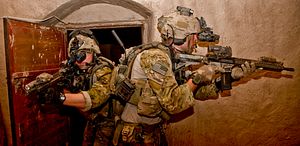In a major policy reversal, the government of Afghanistan lifted a ban on night raids by foreign special forces troops. The ban was originally put in place by former Afghan President Hamid Karzai. His successor, Ashraf Ghani, has now lifted the restriction, granting additional operational flexibility to U.S. special forces. The decision comes as U.S. and international forces prepare to leave Afghanistan, with a small contingent force staying behind for training and counter-terrorism purposes. This decision will primarily affect counter-terrorism operations and will apply to both foreign forces and Afghan National Army Special Forces (ANA-SF).
According to the New York Times, ANA-SF groups are planning on resuming the practice in 2015. Under the recently concluded U.S.-Afghanistan Bilateral Security Agreement (BSA), the document that forms the legal basis of U.S.-Afghan military cooperation into 2015 and beyond, certain ANA-SF units will be accompanied by U.S. Special Operations teams as advisors.
Ghani’s decision to reverse the 2013 ban on night raids sends a positive signal to the United States, but could prove controversial with the population. Karzai’s decision to ban the practice was in part driven by popular protest since government forces’ intrusion into citizen’s homes at night was, naturally, poorly received. However, Ghani’s decision comes at a time when the Taliban has been stepping up its operations across Afghanistan; a spate of deadly bombings has been taking place across the country. While night raids aren’t a silver bullet for Afghanistan’s Taliban problem, they represent one more counter-terrorism option in the ANA-SF and U.S. Special Forces toolkit.
Night raids proved controversial following Karzai’s ban on the practice because U.S. forces ignored his decision, citing the immense value in catching targets off guard at night. Given U.S. forces’ superior military equipment, nighttime ambushes provided a considerable tactical advantage against terrorist targets. A former ISAF spokesman described the practice as “an essential part of our operations.” The spokesman highlighted the relative safety of such raids, noting that over “85 percent are conducted without a single shot being fired.”
According to recent reports, ANA-SF leaders welcome the lifting of the ban for similar reasons. Maj. Gen. Abdul Hameed, one Afghan commander who spoke to the Times, notes the value in night raids and the potential they carry for U.S.-Afghan military cooperation: “We need strong backing of foreign forces during night raids, the helicopters and night vision goggles, GPS equipment, and better guidance,” he said. “Now we have noticed free movement of the Taliban, they are moving around at night and passing messages and recruiting people for fighting, and the only solution to stop their movement is night raids.” Going forward, U.S. forces will likely let Afghan special forces take the lead in any night raids for political reasons.
































